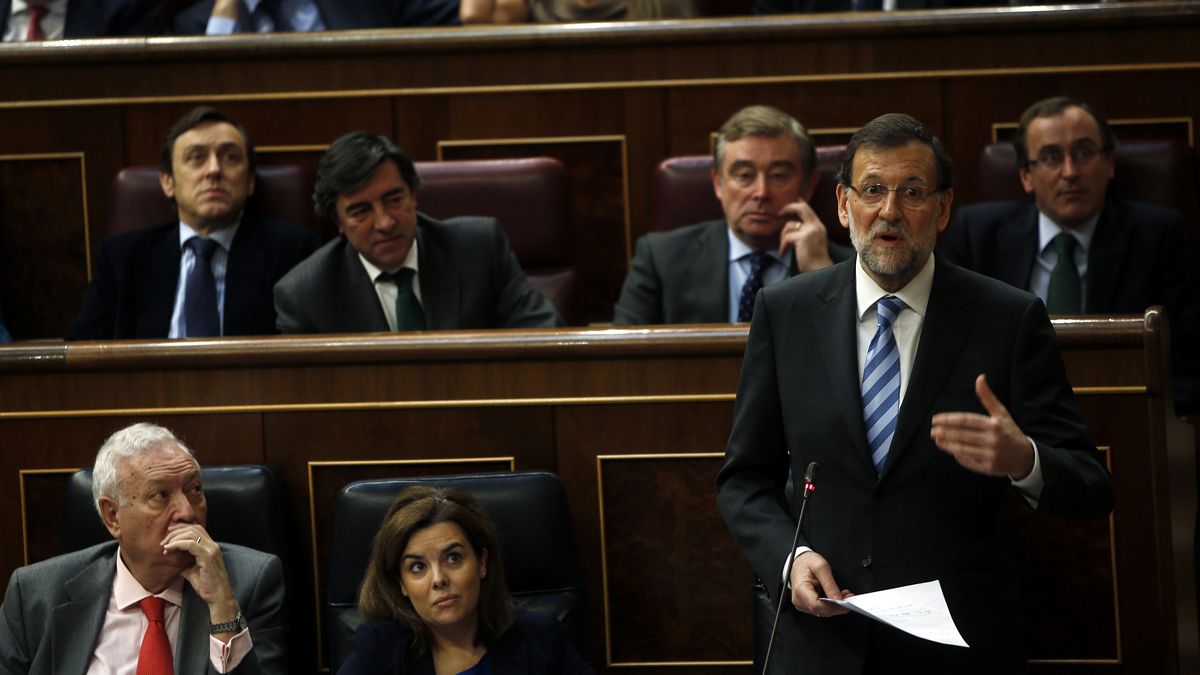Mariano Rajoy has made his first state of the nation address in his 14 months as head of the conservative People’s Party. But the message was one familiar with Spaniards. More sacrifices need to be made by a country ravaged by massive unemployment and tough austerity measures.
Mariano Rajoy, Spanish Prime Minister: “There are no green shoots, passing clouds or early spring. The economic and social reality of our country is terribly tough and based on that we will act. This has just begun and the road left to achieve our great objective for this legislation – job creation – is still long. I insist, not a minute of rest.”
For the leader of the opposition Socialists, Spain’s condition is critical and Alfredo Perez Rubalcaba believes the PP leader is wholly responsible for what he deemed a “disaster”.
“Six million people without work; but there is more: a fifth of Spanish people are at risk of poverty, 33.000 businesses closed during 2012, 8 million pensioners have to pay for their medicines for the first time, and millions of citizens don’t believe in politicians anymore. This is the real state of the nation in February 2013.”
On top of Spain’s economic woes, the stench of corruption is permeating through the ruling party because of its former treasurer Luis Barcenas. He is suspected of holding millions of euros in secret slush fund accounts. Some of the money allegedly found its way into Rajoy’s pockets – a subject he did not shy away from.
“Corruption is a problem that alarms the people and affects the image of Spain. All corruption is unbearable, it is corrosive for civic spirit, it injures democracy and discredits Spain…The government will propose to parliament a law for the control of the economic, financial activity of political parties.”
Javier Villagarcia, euronews:
To better understand the difficult time that Spain is going through, euronews is joined by Inaki Gabilondo, an exceptional analyst and leading Spanish journalist.
How do you think Rajoy is handling the storm caused by the corruption plaguing his party, the People’s Party?
Inaki Gabilondo:
I think he’s ducking and diving but not really confronting the problem. Rajoy has always believed that time is on his side and has ultimately avoided getting involved in things too quickly. He hasn’t mentioned Barcenas (the People’s Party treasurer who instigated the scandal) and by doing so, he behaved so childishly that it swept the Barcenas problem under the rug. In my opinion, the fact that he doesn’t mention it and constantly eludes the issue seems to be irrefutable proof that he just isn’t seeing the problem of corruption clearly, he’s simply trying to solve the problems by kicking the can down the road.
Javier Villagarcia, euronews:
Do you think that Rajoy’s speech about fighting corruption is enough to appease the anger of the Spaniards?
Inaki Gabilondo:
Mariano Rajoy has a big problem with credibility. He enjoys the support of the European institutions, which believe in him. The European Central Bank, Angela Merkel, the Bundesbank all believe in him, but Spanish citizens don’t because he systematically failed to keep every single promise. So that’s the battle he faces right now and although it’s very difficult to make predictions because we haven’t conducted any polls, it seems unlikely that Rajoy’s announcement yesterday to fight corruption will cause any massive ripples or change Spanish society’s opinion of him, which is that they distrust such promises.
Javier Villagarcia, euronews:
Unemployment has continued to rise since Rajoy has headed up the government, for how long will he lay the blame for this at the door of the socialist legacy?
Inaki Gabilondo:
I don’t think he’ll continue to play on this legacy, because from now on, I think Rajoy will count on the fact that the signs are beginning to play a little in his favour. The problem is that for Rajoy, the state of the nation is the state of the national accounts and underlines the national reality in terms of statistics and graphs. Not from the perspective of Spanish society’s genuine suffering. Unemployment for him is an uncomfortable reality now, but he doesn’t see it as a profound drama. The worst outcome is that we see no positive action, taking initiatives that would allow us to know where Spain will find its growth, what the paths are that Spain must take to borrow and grow, the areas that will provide the wealth to rescue Spain from this situation.
Javier Villagarcia, euronews:
As a journalist, you’ve been an exceptional witness in the history of Spain since the transition … where do you think Spain is right now?
Inaki Gabilondo:
Spain is a building that’s been eaten by termites. Spain is a country that has made a huge effort in a short time, accomplished a colossal transformation, but the seams are in the process of coming apart. It’s like a small shirt that’s been put on a boy who’s still growing. We have problems with the credibility of politicians, who society actually regard with a great deal of suspicion. We have problems with the image of the leadership of the State, and of the crown, as well as the image of the justice. We have problems with the image of business leaders, trade unions, the media. There is a widespread school of thought that we’re coming to the end of an era and should be ready to face a new one. We must rebuild another social pact, a new social pact between society and politics, but it’s for the politicians to instigate and not some miraculous man or woman who’ll appear from out of the shadows to save us.


